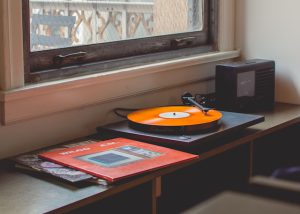The Changing Landscape of Music Discovery
In the age of digital streaming platforms and seemingly infinite choices, it’s a surprising trend to see music lovers abandoning Spotify, the world’s largest music streaming service. A recent article from The Guardian (“There’s endless choice, but you’re not listening’: fans quitting Spotify to save their love of music“) sheds light on this growing trend, suggesting that endless choices and algorithm-driven playlists might be diminishing the magic of discovering and appreciating music. As fans seek more authentic and personal connections to music, they are turning to alternative means of music discovery.
Algorithmic Fatigue and the Lost Art of Discovery

Photo by Eric Nopanen on Unsplash
Spotify’s algorithmic playlists, such as “Discover Weekly” and “Release Radar,” have been praised for introducing listeners to new music and tailoring playlists to their preferences. However, some users argue that this feature is what drives them away, as they feel that over-reliance on algorithms has led to a sterile listening experience. Personally, I am not a fan of these lists for the simple fact that they blend music already within my personal collection and on my current playlists with new music. If this is about discovery, why are you feeding me music already in my playlists? I came across a couple of interesting articles from Emily Sagen at the Daily Trojan (“The Beat Lives On: Music discovery is evolving“) and an older (2012) blog post by Tyler Hayes on Medium (“The Art of Music Discovery“) that emphasize the importance of the art of music discovery, cherishing the process of exploring new music through browsing record stores, reading music magazines, or sharing recommendations with friends.
When I think of my own discovery process, many of the bands that I have followed for years, even decades, came through my discovery process, which included purchasing compilation albums, sharing mix tapes (cassettes) with friends, digging through the dollar cd bins at the local music store, and checking out new artists at the public library (the Washington State library system was AMAZING for music discovery….and finding rare books that are no longer in circulation). During my early teenage years, this was very hit-and-miss, but with file sharing (like Napster) leading to modern-day streaming services, I found myself using these tools to more quickly skim through and identify artists that I would then acquire on cd and vinyl.
As Hayes suggests, the art of music discovery relies on the human touch and serendipity, which is often lacking in algorithm-driven platforms like Spotify. Many fans crave the excitement and romance of finding new tunes in unexpected ways, leading them to seek alternative means of music exploration.
The Rise of Social Media and Online Communities
Sagen’s article highlights the role of social media and online communities in evolving music discovery. Platforms like TikTok, Instagram, and Twitter have become hubs for music recommendations, with users sharing their favorite tracks and engaging in conversations about new releases. These platforms offer a more organic and personal approach to discovering music compared to algorithm-driven playlists.

Photo by Travis Yewell on Unsplash
I find myself exploring YouTube lists and following curated recommendations more than listening to Spotify playlists. I find the experience more organic and authentic, just like sharing a cassette compilation with one of my friends from high school. An algorithm cannot understand why certain artists and songs might resonate. Spotify can sort based on metadata, bpm, and the listening patterns of users, but cannot account for the unique (and sometimes illogical) tastes of the listener.
As fans search for more authentic ways to connect with music, there has been a renewed interest in vinyl records and a resurgence in radio, as noted in The Guardian article. Vinyl offers a tactile, immersive experience that allows listeners to appreciate albums as a whole, while radio offers a more human and personal connection. Plus, when artists made music for albums, they considered the order in which songs appeared, and many albums told an aural (or literal) story with the expectation that people would listen to it from start to finish. Many modern artists have stoped thinking about album structure in this way knowing that most listeners will discover and consume their music one song at a time, bit by bit, as the algorithms pair them with similar songs and artists in an artificial way.
The landscape of music discovery is definitely changing. I don’t know how widespread it truly is, but I’ve personally heard friends state that they are walking away from digital and going back to “classic” methods, leaving Spotify in search of more authentic and personal connections to music. Embracing the joy of discovery through alternative methods like social media, vinyl, radio, and supporting artists directly reflects the evolving nature of music consumption. As fans adapt and seek new ways to connect with music, it remains to be seen whether streaming giants like Spotify will address these concerns and adapt to the changing landscape.
I’m interested in the next generation of discovery. Bring it on.





2 Responses
[…] The Changing Landscape of Music Discovery [blog] […]
[…] conclusion, while the algorithm-driven landscape of music discovery offers a plethora of opportunities for listeners and artists alike, it is important to be cognizant […]